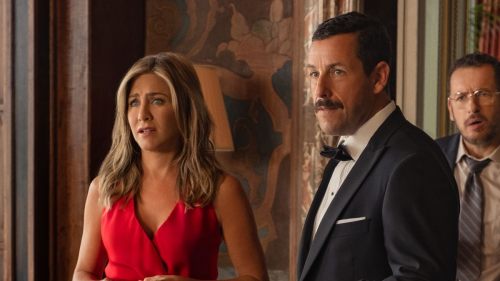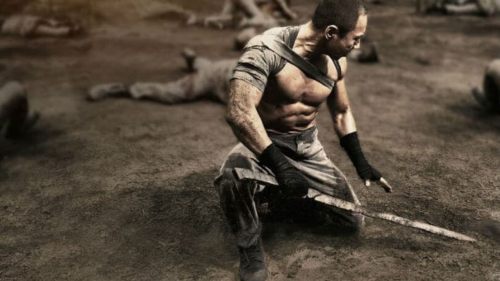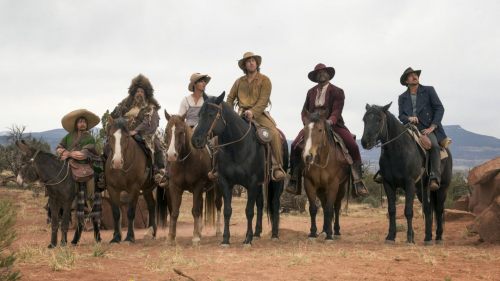LUKE CAGE, Hero Of Ho-Hum
All of Marvel’s Netflix shows have one thing in common, an aesthetic thread that ties them all together: they’re all too fucking long. Every single series, even the ones that work best (Jessica Jones and Daredevil season 2) are distended messes with HOURS of padding and wheel spinning that render the show slow at best, totally inert at worst.
Luke Cage is totally inert. It’s a show where what we might politely call the plot takes until episode 7 to kick in, and that’s after six hours of episodes that are both non-self contained but also not adding up to any over-arching plot. The show is bifurcated so that we have two active villains, one who is ineffectual but well-acted and the other cartoonish but he’s at least getting something done. The first villain, Cottonmouth, is your run of the mill local gang lord (he’s got seven million dollars to his name, making him so low on the Marvel New York City crime ladder I bet Kingpin never even knew he existed), and Mahershala Ali plays him with a determined underdog evil that I liked. Which is what made it harder to watch him get nothing done, have no grand plan and ultimately serve as the prologue for Diamondback, the villain who can actually punch Luke Cage, the bulletproof hero of Harlem.
There’s a third villain, Black Mariah, played by Alfre Woodard, and I believe her story exemplifies everything wrong with Luke Cage the show. Her character is a crooked city councilwoman who is aligned with her gun-running cousin Cottonmouth while claiming to be helping create a new Harlem Renaissance. Her arc in the series is supposed to be going from crooked to criminal, with a murder along the way to sell her turn to the dark side - but it just doesn’t work. I’ve spent a lot of time thinking about why this is, and it comes down to the show breaking the most simple rule in filmed entertainment: show, don’t tell.
See, we are told again and again that Mariah is working for Harlem, but we never really see it. We see photo ops and we are told on newscasts about what she’s doing, but we never see her doing it, we never meet the people she’s working with. That means she comes across as a lying hypocrite from the beginning, using slogans and TV charm to support her killer cousin. There’s no journey here, no sense that she has crossed a real line; earlier in the show she’s brainstorming ways to murder the bulletproof Luke Cage, so when she does finally kill a guy it doesn’t carry much weight.
This might sound minor, but I think it’s the weakness at the center of the show’s metaphor. Luke Cage is presented as the hero of Harlem (despite the fact that this series changes his comic book origin and has him no longer born and raised in the neighborhood!) and his presence is a galvanizing force for the community. But we never know the community. We meet a couple of people who hang out at Pop’s Barber Shop, Luke’s base of operations, and we meet gangsters and their associates, but there are very few community members who get voices and faces in the show. Luke Cage basically puts all this weight on one kid who hangs out at the barber shop and gets beat up by the cops, but it’s not enough. There are montages where Luke helps people, but 13 hours should afford the show the luxury of really dramatizing some of this stuff, folding 'case of the week' storytelling into the larger arc as he assists those hassled by Cottonmouth's criminal empire. We are told it, we are not shown it.
See, if Luke Cage is the hero of Harlem and if Cottonmouth and Diamondback are the cancers afflicting it, we need Mariah to be the character who crosses over, who goes from using sketchy means to truly help the community (see Jimmy Smits’ awesome Papa Feurte in The Get Down, Netflix’s way superior black superhero show) to becoming consumed by the darkness she tries to control. That’s a good arc, and it’s an interesting arc, and this show badly needed at least one interesting arc.
Because I’ll tell you what: for whatever reason they didn’t give one to Luke Cage. The Luke Cage in this show is so different from the guy who walked out of Jessica Jones that I at first thought it was a prequel. It’s not, which makes Luke’s mopey, inactive personality so much more confusing here. His arc is supposed to be a very lengthy (and Christ do I mean lengthy) journey from a guy who just wants to be left alone to a guy who is a hero, but that arc never reads because the show needs him to be in conflict with the bad guys every sixty or so minutes. The better arc was staring the showrunners in the face the whole time, and they even allude to it - have Luke Cage go from mercenary Hero For Hire, as he was originally in the comics, to a selfless do-gooder.
I suspect this aspect of Cage was removed because the show needed to make him as respectable and clearly heroic as possible. The retooled origin for Luke Cage not only removes him from his Harlem roots, it makes him an ex-cop and ex-military. There’s no functional purpose for these additions (in the comics Cage is just a petty criminal before getting railroaded into prison) except to establish that Luke Cage has always been a good guy. But these additions simply deflate the character’s arc, making him someone whose journey is basically getting back to who he was before he got his super powers. Again, the whole thing feels like a prequel. We’re taking Luke Cage to the starting line in this show, as opposed to picking him up where he was left off last year.
If Cage’s arc doesn’t work, it isn’t alone. So little works on this show that I was baffled. So many performances are routinely wooden that I started to assume it was an aesthetic choice (there’s not a single line that Simone Missick delivers as Misty Knight that feels anything but stilted). Even Alfre Woodard, a great actor, ends up stuck delivering clunkers in a way that indicates she’s reading the line for the first time. Much of this has to be laid at the feet of the writers, led by showrunner Cheo Hodari Coker, who put many awkward sentences in the character’s mouths, including a few momentum-stopping and inorganic discussions of pop culture and sports. I get what they’re going for in these scenes but they just simply don’t work.
The good news is that Luke Cage is probably the most visually interesting of the Marvel Netflix shows, even if that only comes to the fore sporadically. The show has the by-now de rigeur dark hallway fight that defines this slice of the MCU, but at times the directors - people like Vincenzo Natali and Paul McGuigan and Guillermo Navarro - get to bring real style and panache. It’s not often enough, and it never quite matches the show’s score by Ali Shaheed Muhammed and Adrian Younge, which has a funky 70s vibe that’s a ton of fun. This is the best score ever attached to any Marvel property.
That score is bolstered by generous use of needledrops and live performances; music pulses throughout Luke Cage, and the great songs were a big part of the reason why I was able to drag myself through the unfocused series. Repetitive fight scenes (how many times can you watch Luke just walk up on guys as they fruitlessly blast him with bullets? You’ll be surprised!) get a new life when set against Wu-Tang or The Stylistics.
I truly wanted to love this series. Imagery of Luke Cage in a hoodie being confronted by the police seemed exciting in the lead up to the show, but in execution the show muddles its own political themes - yes, a bulletproof black man in a hoodie is a powerful symbol in 2016, but is it as meaningful when the bullet holes he sports all come from guns held by black criminals? While the show has characters talk about the relationship between the police and black men (telling, not showing. Again), it never actually dramatizes the problems that we are all too familiar with as black man after black man is gunned down by the police. In fact the only time the cops come after Luke Cage is when a black criminal manipulates them! The show desperately needed a white authority figure as a villain to bring together its themes about the system. I’d recommend reading Jordan Minor’s take for more. And don't miss Justin Charity's searing take on Cage's conservatism.
It pains me to see Luke Cage fail so badly. A huge part of the blame must go to Marvel TV, who insists on having these Netflix shows bloated out to 13 hours (good news: The Defenders is only 8 episodes), but even at a distended length the Coker and his staff have no excuse for the kind of meandering plotlessness that turns Luke Cage into an unfocused slog. I didn’t think any of these shows could be more difficult to sit through than Daredevil’s first season, but Luke Cage proved me wrong.



